Jaljeera and summers are synonymous. This North Indian, non-alcoholic, vegan beverage is not just popular because of its simplicity, but is yummy and has great health benefits too. Made with water, cumin and other amazing ingredients, Jaljeera drink is refreshing, easy to make and the perfect thing to cool yourself with, in the sweltering Indian heat. This Jaljeera recipe is the one you should bookmark right away.
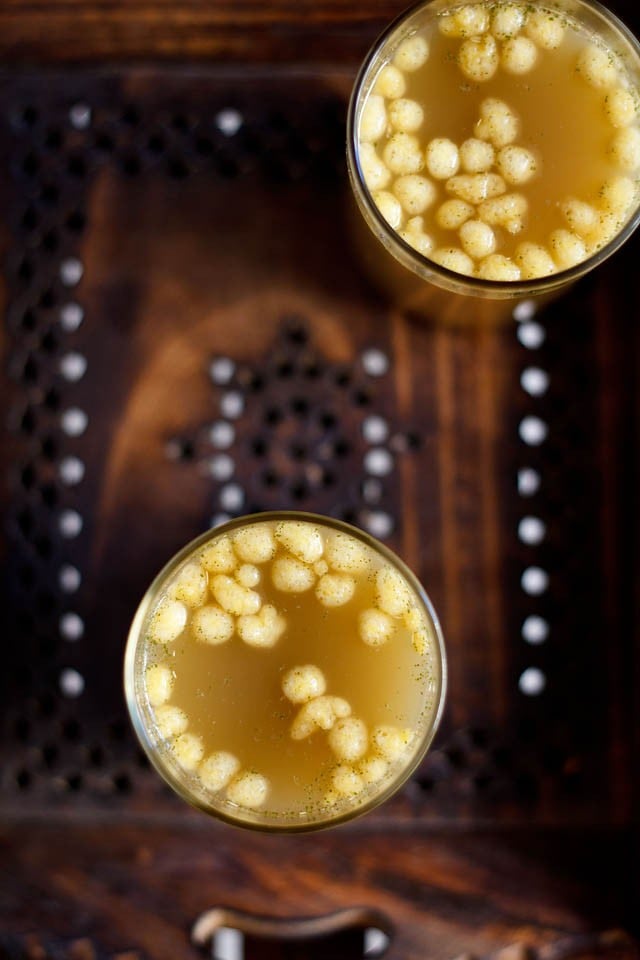
Table of Contents
What is Jaljeera
‘Jal’ means ‘water’ and ‘jeera’ is cumin in English. So, the literal translation of Jaljeera is ‘cumin water.’ However, this beverage is far from the earthy and peppery taste of cumin water. It is not just this, but also spicy, tangy and fragrant due to the addition of other robust ingredients like fennel, mint, tamarind and pepper.
This is a familiar drink on North Indian streets sold by vendors who store it in a ‘matka’ or a large earthen pot which naturally keeps it cool. It is also served as an element in other known street foods of India like Golgappa or Pani Puri.
Jaljeera benefits are known to all. Some of which are mentioned below for you to consume it regularly.
About Jaljeera Recipe
Jaljeera is a beverage that’s bursting with flavors. Its punch can give a kick and energize the body instantly.
Some people may not like the taste as it’s a bit on the hotter side and can knock down the taste buds. You need to be open-minded and accepting while trying Jaljeera for the first time.
This recipe is inspired from Nita Mehta’s cookbook ‘Taste of Delhi’. There are many ways of making a Jaljeera. But all recipes more or less use the spices and herbs that are mentioned below.
The addition of boondi (tiny globules of crisp, fried gram flour) in this drink is also a common practice at many places.
The best way to consume Jaljeera is to drink it chilled by itself. Or have it in between meals as an appetizer. Because of its digestive properties, many restaurants also serve it at the beginning of a meal.
Jal Jeera Spices and Herbs
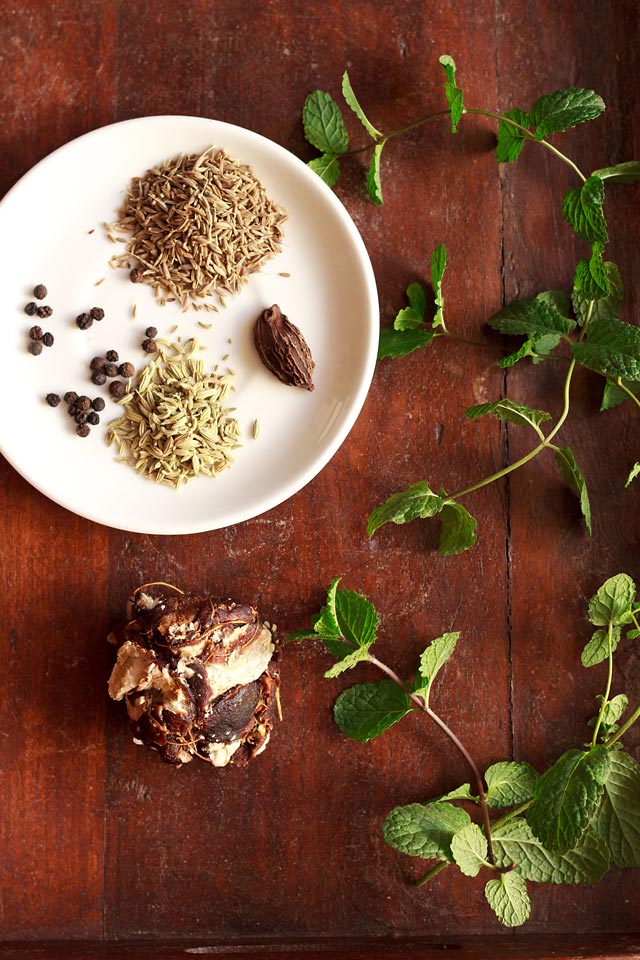
The plethora of spices and herbs that go in the preparation of Jaljeera is what makes it more than just a refreshing drink. Check these out.
- Cumin seeds or jeera – earthy flavor, good for digestion
- Fennel seeds or saunf – sweet and aromatic, digestive and antioxidants
- Black pepper or kali mirch – pungent and spicy, digestive and adds an extra punch to the drink
- Dried mango powder or amchur – tangy, adds a nice tart flavor
- Black salt – digestive and adds more flavor, often used in other Indian drinks like Shikanji and chaats
- Mint leaves – fragrant and sweet, has cooling and digestive properties
- Tamarind – adds sourness, cooling for the body
- Ginger – good for digestion, but optional as it produces heat
How to make Jaljeera
Prep and Make Jaljeera Chutney
1. Soak 1 tablespoon tightly packed tamarind in ¼ cup hot water for about 20 minutes. Soaking helps to soften tamarind and it can be ground easily with the other ingredients.
If out of tamarind, move to step 2 below. And add lemon juice instead.
The amount of lemon juice that you will need to add will depend on the tangy taste you prefer in the drink. So add about ½ to 1 tablespoon first and increase it if you want a more tangy taste.
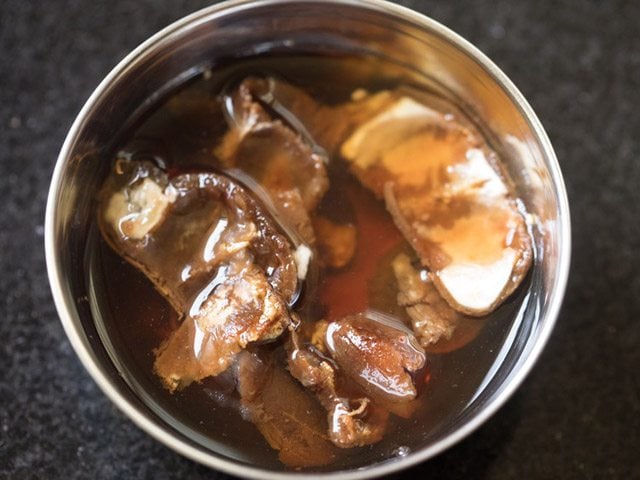
2. Rinse ⅓ cup loosely packed fresh mint leaves well with water. Drain all the water.
Add the mint leaves in a small grinder jar or blender. Only use the mint leaves. Do not add the stems or else the Jaljeera can become bitter.
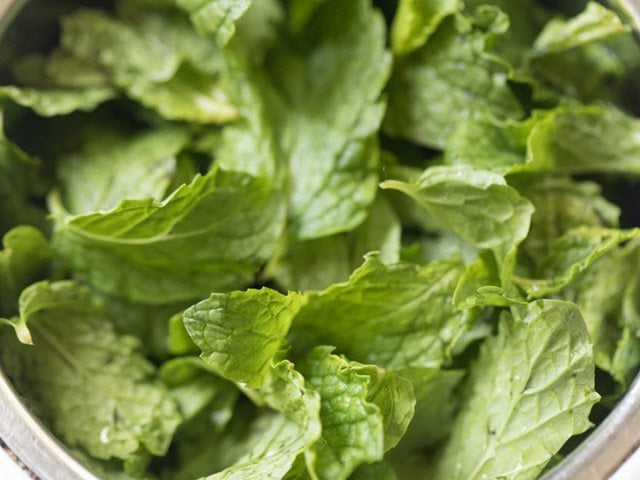
3. Add the soaked tamarind along with its water. Make sure there are no seeds in the tamarind.
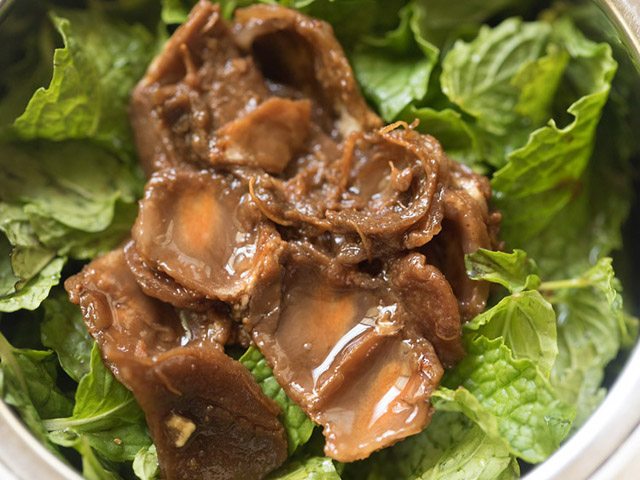
4. Add the following spices:
- 1.5 teaspoons cumin seeds
- 1 teaspoon fennel seeds
- ½ teaspoon black pepper
- seeds from 1 black cardamom
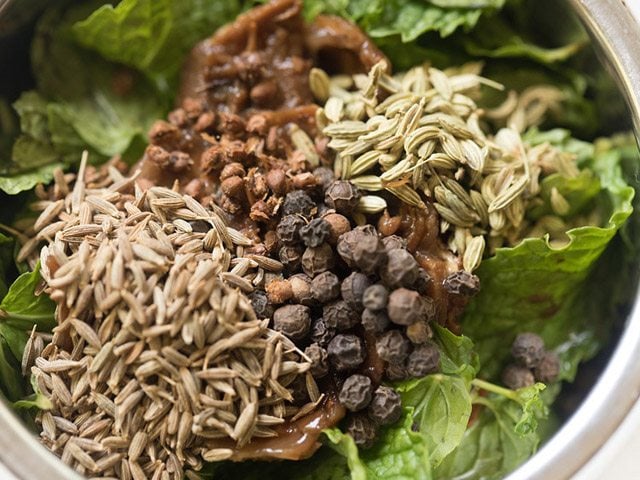
5. Next, add the below listed ground spices and seasonings:
- 1 teaspoon dried mango powder (amchur powder)
- 1 teaspoon chaat masala
- 1 pinch asafoetida
- black salt as required
If you do not have dried mango powder, then you can add some lemon juice/kachri powder/ bael powder. Instead of black salt, you can use edible rock salt or sea salt.
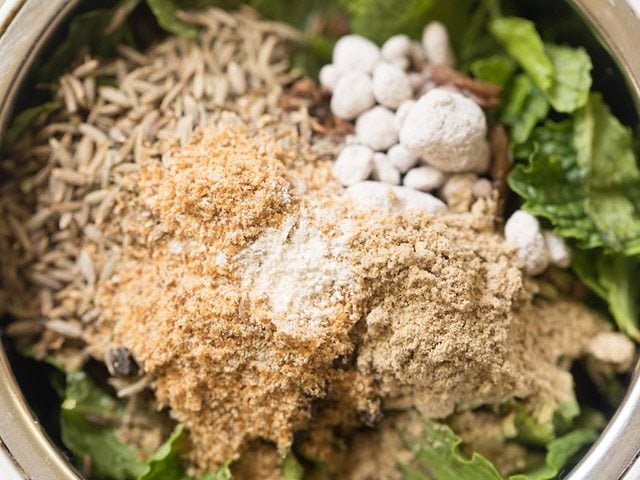
6. Grind to a fine and smooth consistency. If you want, you can even strain the chutney using a tea strainer.
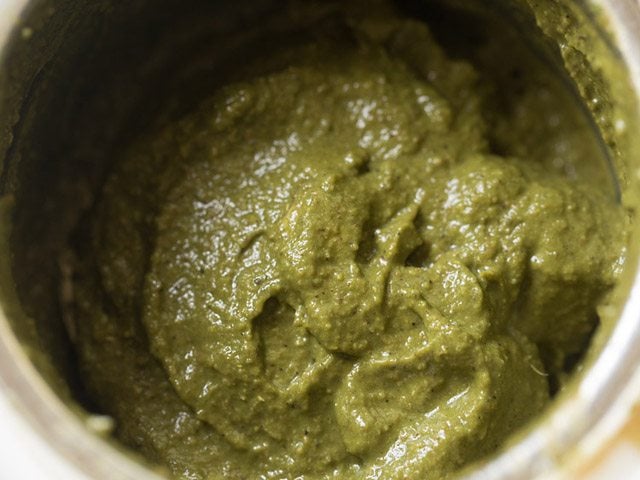
Make Jaljeera
7. Take the Jaljeera chutney in a bowl. Add 1.5 cups water.
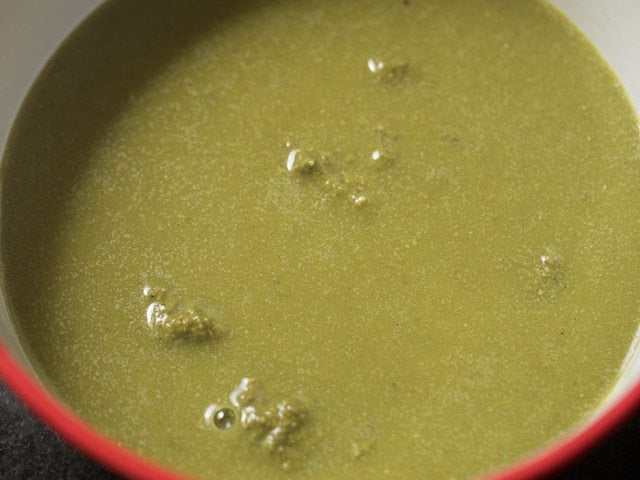
8. Mix very well. Check the taste of Jaljeera and add more salt and dried mango powder if required. You can also add some lemon juice if you want.
- Tip 1: If you like a mix of sweet, spicy and tangy drink, feel free to add some sugar or jaggery after adding water. Mix well until the sugar or jaggery is dissolved.
- Tip 2: For a more lighter and milder version of the drink, add some more water. You could also add cold water if you prefer.
- Tip 3: In case the Jaljeera tastes bitter (due to the type and quality of mint leaves), add some lemon juice to balance the bitterness. Keep it in the refrigerator for few hours.
- Tip 4: If you prefer, you can strain this Jaljeera water before refrigerating it.
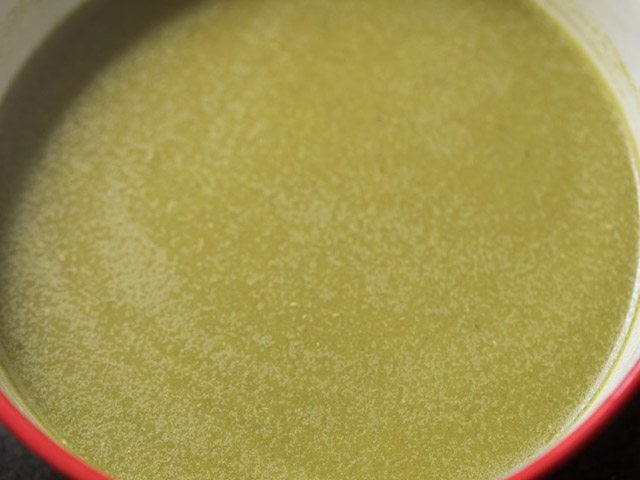
9. While serving, you can add some boondi, a pinch of chaat masala and a few mint leaves in each glass.
Boondi can be soaked in water for 20 to 30 minutes, then squeezed and added while serving.
Jaljeera benefits are many. So, you can have it regularly.
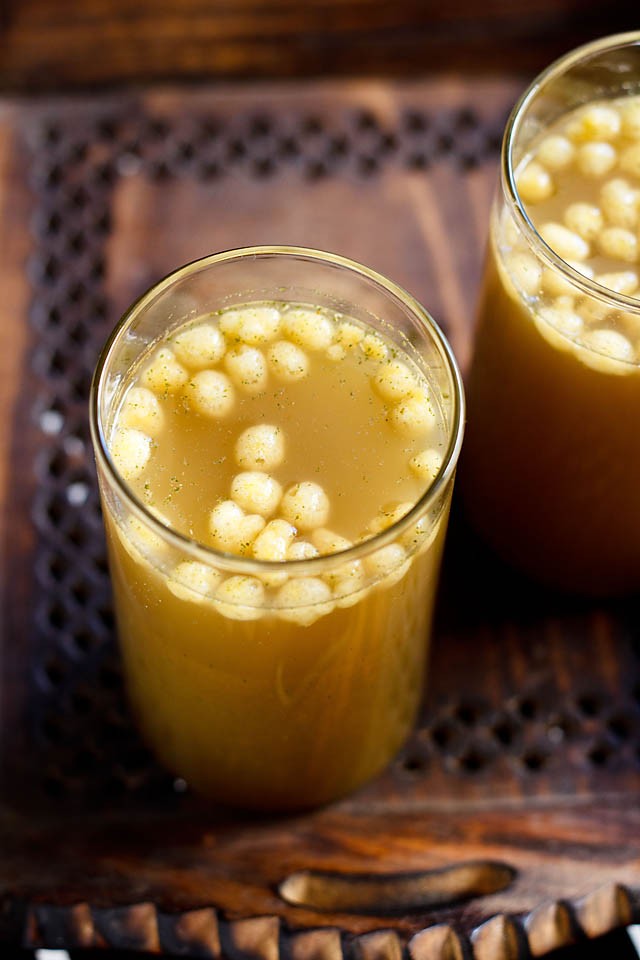
Jaljeera Benefits
Jaljeera is a wonder beverage brimming with health benefits. This is why you should include it in your diet:
- Great for digestion, helps in relieving heartburn, acidity, intestinal gas, nausea, abdominal and menstrual cramps, vomiting, etc.
- Helps in rehydration, keeps the body hydrated and good for detoxification.
- The cumin in Jaljeera is a powerhouse of iron. Thus, helps in the prevention of anemia, aids immunity and cools the body.
- Dried mango powder or amchur is an excellent source of Vitamin C, helps in improving immunity.
- Perfect choice for weight watchers as it has a very low-calorie count.
Expert Tips
- Make sure to use only the mint leaves and not the stems in this recipe. The stems will add a bitterness to the drink.
- Instead of tamarind, add fresh lime juice or lemon juice. You can add lemon or lime juice after you add water to the Jaljeera chutney or when blending the Jaljeera ingredients.
- You can use lemon juice, kachri powder (powder made from a wild variety of cucumbers) or bael powder (powder made from wood apple/stone apple) in place of dried mango powder. Edible rock salt, pink salt and sea salt can be used in place of black salt.
- In case the Jaljeera tastes bitter, you can add some lemon juice to balance the bitterness.
- Soak the boondi in water for 20 to 30 minutes. Later squeezed and used for the Jaljeera. You can also skip using the boondi in this drink.
- To take out the seeds from a black cardamom, lightly crush the black cardamom in a mortar-pestle and then remove the seeds.
FAQs
Jaljeera is a popular Indian beverage made from water and cumin seeds. Other flavorings and seasonings are added to it to enhance the taste. It has great digestive properties, is good for combating the heat during summers and cools the body.
Yes, you can try drinking Jaljeera every day if it suits you. Also consider the season and climate. Since the drink has many spices, only drink it, if these spices suit your physical constitution. Though Jaljeera benefits are many and it is a natural drink.
Yes, you can.
You can use lemon juice, kachri powder or bael powder in place of amchur in the Jaljeera chutney recipe.
The best way to serve Jaljeera is chilled or with a few ice cubes. Adding boondi, some chaat masala and few mint leaves while serving also elevates the flavors of Jaljeera.
Yes, you can surely do that.
Yes, you can. In that case, you can skip making the Jaljeera chutney in this recipe.
More Indian Cooling Drinks To Try!
Please be sure to rate the recipe in the recipe card or leave a comment below if you have made it. For more vegetarian inspirations, Sign Up for my emails or follow me on Instagram, Youtube, Facebook, Pinterest or Twitter.
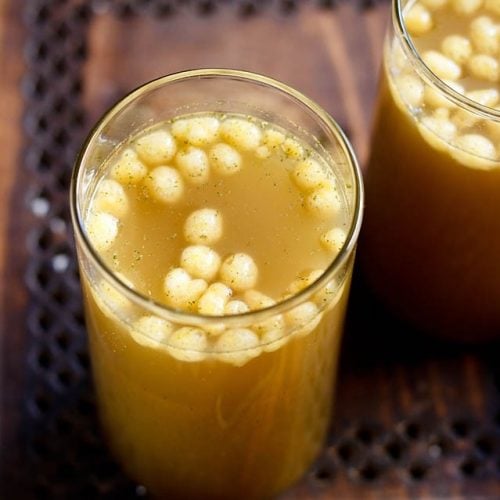
Jaljeera Recipe
Ingredients
For soaking tamarind
- ¼ cup hot water
- 1 tablespoon tamarind tightly packed, for a more pronounced sourness, you can add ½ tablespoon of more tamarind (imli)
For making jaljeera chutney
- ½ cup mint leaves – loosely packed
- 1.5 teaspoons cumin seeds
- 1 teaspoon fennel seeds
- ½ teaspoon black peppercorns
- 1 pinch asafoetida (hing), optional
- 1 black cardamom – seeds removed and kept, optional
- 1 teaspoon dried mango powder (amchur powder)
- 1 teaspoon chaat masala powder – optional
- black salt or edible rock salt or pink salt or regular salt, add as required
For making jaljeera
- 1.5 cups water
- 1 to 2 tablespoons boondi or add as required, optional
- few mint leaves for garnish – optional
Instructions
Soaking tamarind
- Soak tightly packed tamarind in ¼ cup hot water for about 20 minutes or until the tamarind softens.
Making jaljeera chutney
- Rinse mint leaves well with water. Drain all the water. Add the mint leaves in a small grinder jar. Only use the mint leaves. Do not add the stems as then the Jaljeera can become bitter.
- Add the soaked tamarind along with its water. Make sure there are no seeds in the tamarind.
- Add cumin seeds, fennel seeds, black pepper and black cardamom seeds.
- Next, add amchur, chaat masala, asafoetida and black salt as required.
- If you do not have dried mango powder, then you can add some lemon juice, kachri powder or bael powder also. Instead of black salt, you can use rock salt or sea salt.
- Grind to a smooth chutney. If you want, you can even strain the chutney using a tea strainer.
Making jaljeera
- Take the Jaljeera chutney in a bowl. Also add 1.5 cups water.
- Mix very well. Check the taste of Jaljeera and add more salt and dried mango powder if required. You can also add some lemon juice if you want. If you prefer a more lighter and mild version of Jaljeera, add more water.
- In case the Jaljeera tastes bitter (due to the type and quality of mint leaves), then add some lemon juice to balance the bitterness. Keep Jaljeera in the refrigerator.
- While serving, you can add some boondi, a pinch of chaat masala and a few mint leaves in each glass.
- Boondi can be soaked in water for 20 to 30 minutes. Later squeeze the water and keep them aside. Add boondi while serving Jaljeera.
Notes
- Use mint leaves which are green and look crisp. Do not use the stems as they can make the jaljeera drink taste bitter.
- If you do not have tamarind, add lemon juice instead. Add less or more of the lemon juice according to your taste preferences.
- You could also add some coriander leaves (cilantro) while making the jaljeera chutney if you like.
- To make a sweet tangy drink, add some sugar or jaggery after you add water.
- Rinse the leaves in water a few times using a small colander or strainer. Drain all the water before blending the mint leaves to make the jaljeera chutney.
Nutrition Info (Approximate Values)
This Jaljeera recipe post from the blog archives, first published in April 2013 has been republished and updated on December 2022.
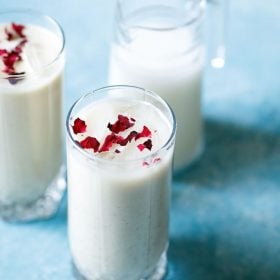
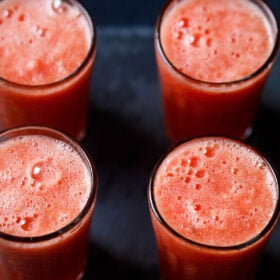
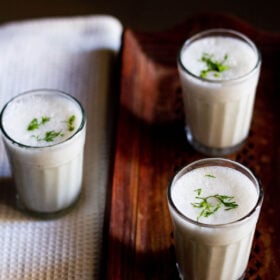
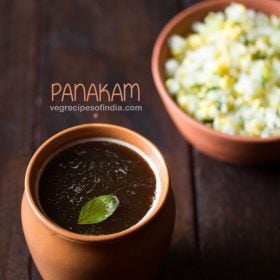
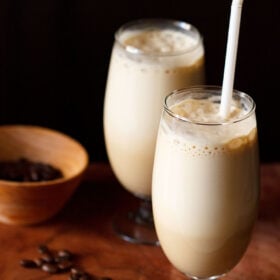
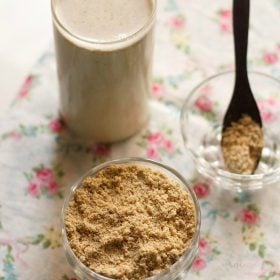
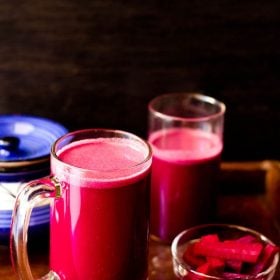
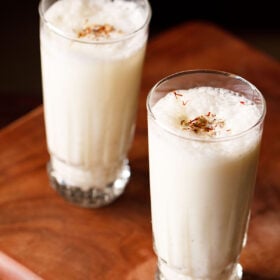








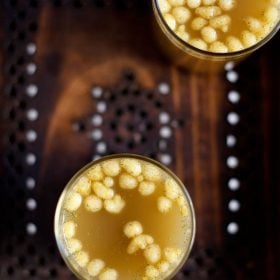
Hi,
Dasaana.
I bless the day, I found your blog on the web.. you are certainly blessed by Goddess Anpurnna.
I am 21 and suffer through acidy and heartburn strokes the every alternate day, I have consulted many doctors but hate to intake what they prescribe. I have noted down the jal jeera recipe and the kokum sherbet.
I request you to suggest me some more stomach soothing recipes.
Thank you
🙂
thanks a much maria. humbled with your words.
for acidity, sabja (sweet basil seeds) are very good. just mix with some water and soak for 30 minutes. you can then just have this water plain. or add soaked sabja in juices or fruit based drinks. there is another way you can have kokum and that is having kokum curry where – kokum extract and coconut milk is mixed and then tempered. its good for the stomach. you can also include rose extract or rose water in your food.
1. sabja seeds: link here – https://www.vegrecipesofindia.com/basil-seeds-or-sabja-seeds/
2. kokum curry recipe here – https://www.vegrecipesofindia.com/kokum-curry-sol-kadhi/
Recipes are very useful for daily drinks as body stimulating
thank you roy.
Hi Dassana. I love your blog and your recipe collection. This Jal Jeera recipe is just great. it has me drooling!!
I’ve just done a write up on Indian summer drinks on my blog and have linked to your recipe. You can have a look here. Hope you like it 🙂
http://helpingthehomemaker.blogspot.in/2015/04/indian-summer-drinks-roundup.html
thanks kimberly for the link and your motivating words. i will have a look in my free time.
Love this anyday …looks so refreshing with lovely pics ..got in my draft too 🙂
my all time favourite ! esp the boondhi on the top wow 🙂
Wat a refreshing cooler to beat the heat